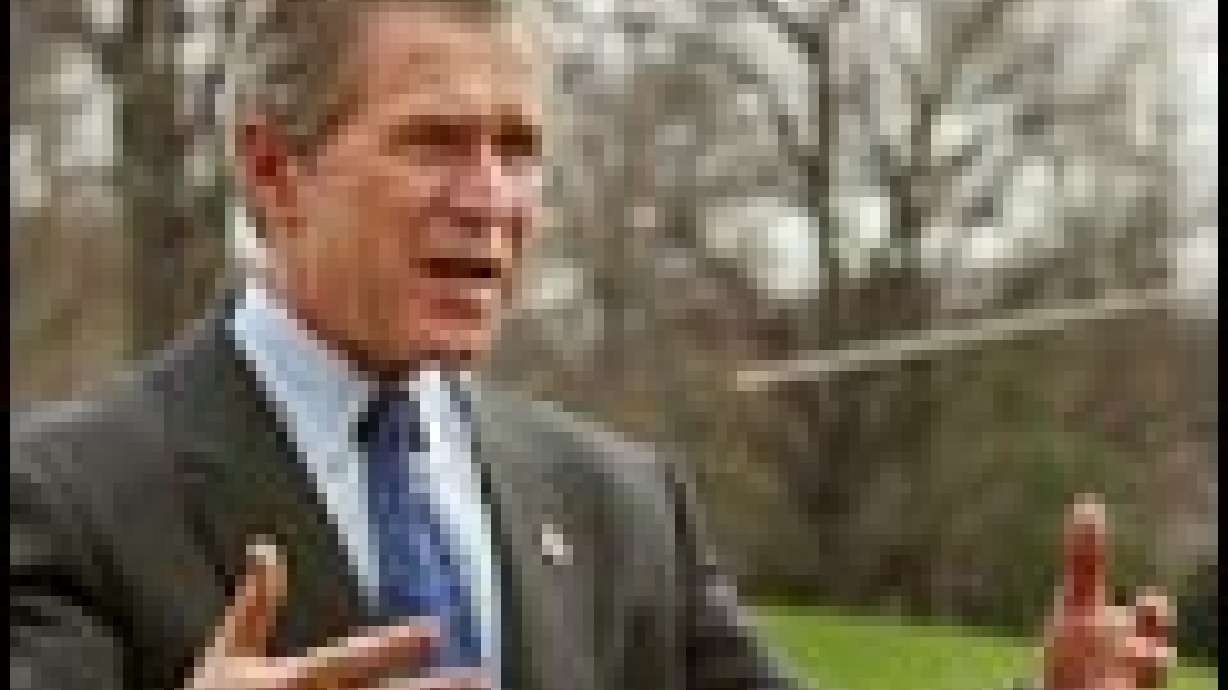Estimated read time: 4-5 minutes
This archived news story is available only for your personal, non-commercial use. Information in the story may be outdated or superseded by additional information. Reading or replaying the story in its archived form does not constitute a republication of the story.
WASHINGTON (AP) -- President Bush, saying U.S. troops are making steady progress in Iraq, is asking Congress for $74.7 billion to pay for six months of combat, humanitarian aid and rebuilding.
The bulk of the request, $62.6 billion, will support U.S. troops both in Iraq and other operations related to the broader war on terrorism, the White House said Tuesday. The rest of the money will go to humanitarian assistance in Iraq, other foreign aid and homeland defense programs in the United States.
The package will help pay for transportation of forces to the Persian Gulf region, supplying troops and maintaining equipment. It also will allow the Pentagon to replace cruise missiles, smart bombs and other high-tech munitions, and provide combat pay to troops.
Bush refused to provide a cost estimate before the attack on Iraq started, asserting there were too many variables to give a reliable price tag. On Monday, five days into the military campaign, the administration tipped its hand, outlining for congressional budget chiefs his spending plans in the form of a "supplemental" request.
Bush was formally unveiling the new spending package Tuesday at the Pentagon, and asking Congress to pass it by April 11. He planned to praise U.S. forces for what the White House on Tuesday called steady progress in Iraq.
Meanwhile, a senior administration official said national security adviser Condoleezza Rice was visiting the United Nations Tuesday to discuss humanitarian issues with Secretary-General Kofi Annan.
Lawmakers grumbled after a Monday meeting with Bush that they were frozen out of their oversight role on spending, and predicted Bush would soon return asking for more war money.
"This is just the beginning. This is the first down payment, and the American people have the right to know that," said Sen. Robert C. Byrd, D-W.Va.
"I told the president that I was glad to be invited down today to discuss the supplemental bill, but I said that Congress ought to be in at the start of the process and not just brought in at the end to sign the check," Byrd said.
A senior administration official said the White House kept its estimates close to the vest because it could only have provided projections that varied widely depending on different scenarios, such as Saddam Hussein's surrender versus full-scale war.
The White House concluded that sharing projections privately with lawmakers would have led to leaks, said this official, who sidestepped a question about why the administration did not want the public to know the war cost estimates.
A supplemental appropriations bill, in effect, is Congress' way of writing a check to cover special emergency or unanticipated expenses not provided for through the regular appropriations process.
Bush tacked aid to various other countries onto the budget request -- most of them regional neighbors like Jordan and Israel.
Turkey was once promised $15 billion to let in U.S. troops for a ground war. Turkey refused, and Bush responded by slashing the aid to $1 billion.
Far-flung nations including the Philippines, Colombia and Afghanistan are among the other aid beneficiaries in the budget measure -- all tucked under the heading "Global War on Terrorism" on an administration summary sheet. In all, the Bush is requesting $2.4 billion to create a flexible account focused on relief and reconstruction for Iraq.
Homeland security would get $4.2 billion and coalition allies get $1.4 billion. The staunchest of Bush's partners, British Prime Minister Tony Blair, was meeting Wednesday and Thursday with Bush at Camp David.
Democrats said they were alarmed at Bush's plan to give broad discretion to Defense Secretary Donald H. Rumsfeld on details of how Pentagon funds will be spent. Bush made a similar request last year, which members of both parties forced him to change and to provide details on how the money would be used.
Rep. David Obey of Wisconsin, top Democrat on the House Appropriations Committee, said Rumsfeld "wasn't appointed to be the U.S. Congress with the power of the purse. ... We're supposed to know what we're doing before we open the purse strings."
The administration hopes for substantial contributions from other countries for reconstruction, but not in the immediate future.
In their meeting Monday afternoon, Bush asked lawmakers not to overspend or load up his budget request up with other items. In military parlance, the measure is known as C.O.W.S. -- Cost of the War Supplement, a senior official noted, adding that the White House hopes it will not be "milked irresponsibly."
The White House projects that the package would swell the federal budget deficit to close to $400 billion for the fiscal year that ends in September.
(Copyright 2003 by The Associated Press. All Rights Reserved.)








